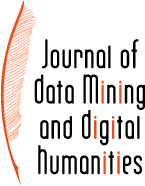 |
Pramit Chaudhuri ; Joseph P. Dexter - Bioinformatics and Classical Literary Study
jdmdh:1386 - Journal of Data Mining & Digital Humanities, 19 août 2017, Numéro spécial sur le traitement assisté par ordinateur de l‘intertextualité dans les langues anciennes - https://doi.org/10.46298/jdmdh.1386 This paper describes the Quantitative Criticism Lab, a collaborative initiative between classicists, quantitative biologists, and computer scientists to apply ideas and methods drawn from the sciences to the study of literature. A core goal of the project is the use of computational biology, natural language processing, and machine learning techniques to investigate authorial style, intertextuality, and related phenomena of literary significance. As a case study in our approach, here we review the use of sequence alignment, a common technique in genomics and computational linguistics, to detect intertextuality in Latin literature. Sequence alignment is distinguished by its ability to find inexact verbal similarities, which makes it ideal for identifying phonetic echoes in large corpora of Latin texts.
Although especially suited to Latin, sequence alignment in principle can be extended to many other languages.
- Source : OpenAIRE Graph
- Graduate Research Fellowship Program (GRFP); Financeur: National Science Foundation; Code: 1144152
